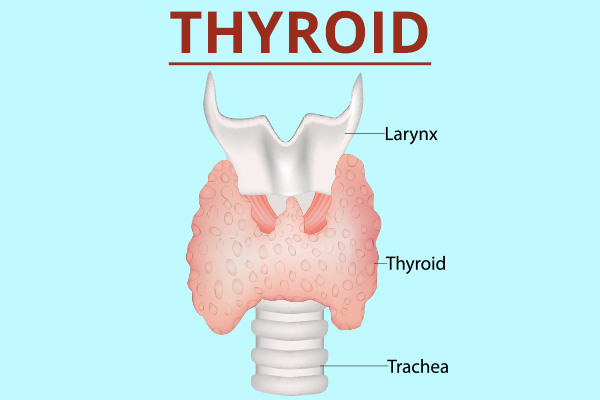In this article:
The thyroid gland is a butterfly-shaped endocrine gland that produces hormones. These hormones are carried through the blood to virtually all the body organs, enabling many of their primary functions, which range from metabolism control to mood regulation.

Thus, any problem with the functioning of this gland can negatively affect the workings of the entire body. This article discusses the ways in which an impaired thyroid gland may affect the body along with the associated symptoms.
Common Problems Associated With the Thyroid Gland
A problem in the thyroid gland may be a functional issue, structural issue, or both.
Functional issues include hypothyroidism (1) (underactive thyroid gland) or hyperthyroidism (2) (overactive thyroid gland). Structural issues include thyroid nodules, (3) thyroid cancer, or an enlarged gland (goiter). (4)
Major Symptoms of Thyroid Dysfunction

The thyroid gland helps to regulate metabolism, body temperature, mood, heart function, bowel movements, skin health, and other functions.
The word “hypo” means below. When one has hypothyroidism, the gland releases lesser amounts of thyroid hormones (T3 and T4). This can lead to:
- Sluggish sensation
- Cold intolerance
- Decreased bowel movements
- Depressed mood
- Memory problem
- Dry skin
- Hair loss
- Weight gain
The most common cause of hypothyroidism in the United States is an autoimmune condition called Hashimoto’s disease. (5) The word “hyper” means above. A hyperthyroid gland produces too much thyroid hormone. This may result in:
- Anxiety
- Heart racing
- Palpitations
- Increased bowel movements
- Irregular menstrual cycles
- Hair loss
- Weight loss
Grave’s disease is the most common cause of hyperthyroidism. (6) It is an autoimmune disorder that is associated with bulging of the eyes.
Medical Conditions That Mimic the Symptoms of Thyroid Dysfunction
Thyroid symptoms are vast and non-specific. Fatigue, weight gain, and hair loss are frequent complaints. A number of conditions can mimic these symptoms, and often, patients without thyroid problems complain of the same symptoms.
It is fairly common for doctors to have patients with multiple complaints but with normal thyroid levels. This can be frustrating for the patient, and it is understandable that the doctor will still look with suspicion at the thyroid gland.
Many times, some of the symptoms are due to lifestyle factors, including what I like to call the S’s, which include sleep, stress, sedentary lifestyle, substances, and seasonal causes. Many patients begin to feel better when these are addressed. The last S is sickness.
Since some causes of thyroid disease are caused by an autoimmune disorder, patients are more susceptible to other autoimmune disorders such as lupus, Addison’s disease, pernicious anemia (B12 deficiency), type 1 diabetes, and celiac disease.
Depression, anxiety, sleep apnea, insomnia, anemia, infections, perimenopause, and postural orthostatic tachycardia syndrome (POTS) may also be considered. Sometimes, symptoms may be due to drug interactions as well.
Can a Person Have Normal Thyroid Levels and Still Suffer From Symptoms?

It is unlikely for one to have significant symptoms, while thyroid levels are normal. Oftentimes, something else is taking place. One of the conditions mentioned earlier may be the culprit.
Some physicians may also aim to keep the TSH in the low normal range as long as the patient is not at high risk for heart problems or bone loss.
A physician may also consider adding a T3 supplement if this hormone’s level is low. Switching agents to a name-brand or another supplement that has less additives may be considered.
Relationship Between Poor Nutrition and Thyroid Problems
As mentioned earlier, vitamin B12 deficiency is common in individuals who have autoimmune thyroid disorders such as Hashimoto’s disease and Grave’s disease. (7)
Vitamin B12 deficiency may cause fatigue, weakness, insomnia, confusion, memory loss, numbness, and irritability. Vitamin D deficiency is more and more being associated with multiple symptoms such as fatigue, muscle cramps, bone pains, bone loss, and mood changes. (8)
Iron deficiency may be a contributor to fatigue, weakness, headaches, hair loss, and shortness of breath. Thiamine, magnesium, and selenium are also vital for the thyroid to function well, (9) but it is important to not overdo it when taking supplements.
Unhealthy Lifestyle Habits That Trigger Thyroid-Like Symptoms
Poor sleep, diet, and lack of activity will contribute to hypothyroidism-like symptoms.
Misdiagnosing Depression as a Thyroid Problem
There are millions of people with depression, and it is estimated that the diagnosis is missed 50% of the time by primary care providers. (10)
Symptoms of depression may include lack of energy and motivation, poor concentration, lack of appetite, insomnia, excessive sleepiness, and weight loss or gain. Sound familiar?
There is a lot of overlap between depression and hypothyroidism, so it is possible that one has depression rather than hypothyroidism. In such cases, the thyroid labs are normal.
Depression screening tools may be used to discern the real problem. It is important to also note that untreated hypothyroidism may cause one to be depressed.
Can Sleep Apnea and an Underactive Thyroid Be Diagnosed Interchangeably?
Sleep apnea affects 5%–30% of the US population. (11) Symptoms of sleep apnea include daytime sleepiness, fatigue, morning headaches, snoring, and gasping during sleep. While hypothyroidism may not cause sleep apnea, many do have both conditions.
Expert Insights About Thyroid Problems

Endocrinologists see a fair share of patients who have normal thyroid lab results yet still have symptoms. Oftentimes, patients see multiple physicians searching for an answer, and sometimes this leads them to homeopathic remedies.
I am very sympathetic to these concerns, but I strongly encourage patients to consider other options. It is troubling to watch patients spend a lot of money on agents that may offer little to no benefit or may even be harmful to the body. There are agents out there that may offer a boost, but they are likely temporary solutions and only a Band-Aid.
My troubleshooting strategy is to take a detailed history. Oftentimes, the answer is related to sleep, stress, sedentary lifestyle, substances, seasonal factors, or sickness. Next, I make certain the medication is taken appropriately, and no interfering agents are on board. I then order a thorough lab test to rule out other potential causes of these symptoms.
If no cause is found, then I consider switching to a different thyroid supplement or work on improving the S’s.
Final Word
I always stress the importance of being patient while working with your doctor. The thyroid is one of the most exploited parts of the body due to its non-specific symptoms.
Unfortunately, a lot of people end up spending a lot of money on unnecessary meds, supplements, and procedures in an attempt to feel better. Do not be quick to eliminate a medication prescribed by your physician because you felt bad.
It is very possible that you felt bad simply because you had not given the medication time to normalize your levels or something else is contributing to your symptoms.
- Was this article helpful?
- YES, THANKS!NOT REALLY


